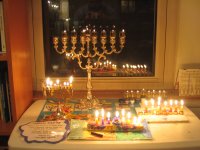Originally I had hoped that my blog survey would highlight blogs as a kind of a bridge between generations of Jews. In theory, this was a nice idea. It would have added another positive aspect of Jblogging to the mix. The best bridge between generations is our Torah.
Jblogs are a great vehicle for yidden to have an opportunity to read other views on different hashkafos (read legitimate forms of avodas hashem). In a way Jblogs do help some generations understand what frum people deal with and what is on our collective mind.
I’ve got a majority of Gen Xers, a few Millennials and 6 or 7 readers who are at the edge of baby boomers and the Silent Generation who just turned 60.
Blogging is fun. I enjoy writing and the allure of having an audience gives me a warm and fuzzy feeling, I admit. But I have found myself thinking even before I posted my Question for JBloggers, does my blogging comes at the expense of my own personal involvement within my Jewish community?
Is it the Baby Boomers who haven’t picked up on the medium of blogs or do they know something that I don’t? Time will tell. For now, I continue to write and hopefully will get more involved off-line, as well. Thanks for reading.
If anyone is interested in reading more about generations and their impact on history I suggest anything by William Strauss and Neil Howe or check out fourthturning.com.





